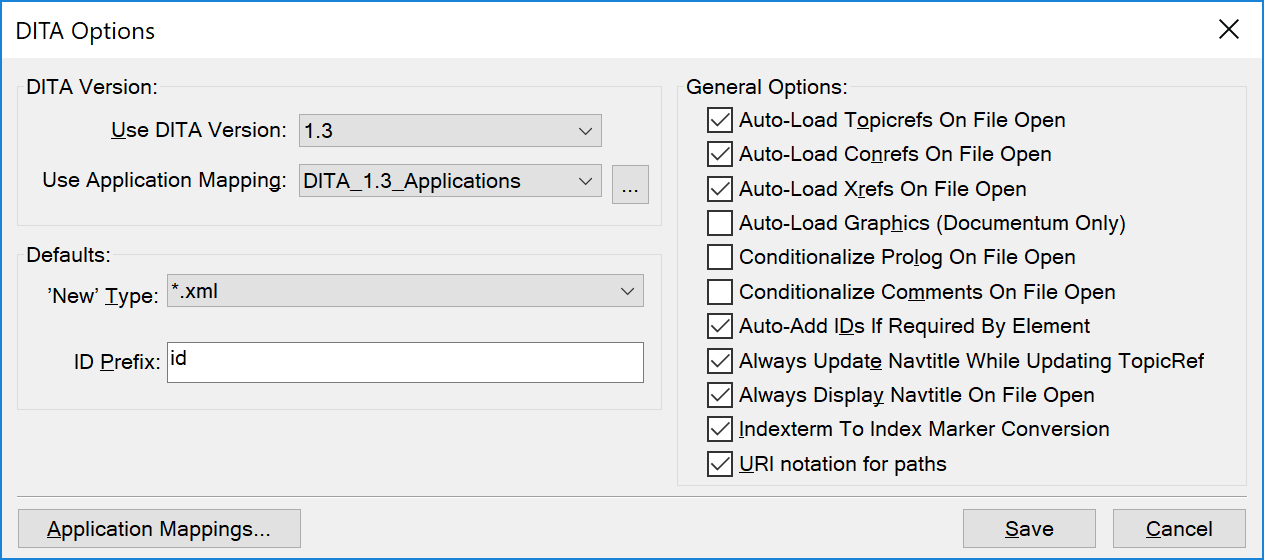Use the DITA Options dialog in FrameMaker to configure and customize various options for DITA topics.
The DITA Options dialog in FrameMaker allows you to configure options such as the DITA version and auto-load settings to open DITA topic files.
Use the DITA Options dialog to set general, import, and export-related DITA options. DITA options are global settings for the authoring environment. This means that changes to the option affect all DITA files that you work on.
Choose to open the DITA Options dialog

- DITA Version
-
By default, FrameMaker is set to use DITA 1.3. With this option, you can open and work on documents created with earlier version DITA. However, if you add any elements or attributes that are available only with DITA 1.3 and save the topic, the topic is converted to DITA 1.3. If you open that topic later with an earlier version of DITA, you will get validation errors.
- New Type
-
You can set the default file type that FrameMaker will use when you create a new topic. The default ‘New’ Type specifies the filename extension for a new topic (.xml or .dita). This extension is applied only if you do not specify an extension for the new file.
- ID Prefix
-
If the Auto-Add IDs If Required By Element option is checked, you can specify a prefix to the topic ID that is auto-generated by FrameMaker. By default, FrameMaker adds
@idas the prefix to the topic ID. - Auto-Load Topicrefs On File Open
-
Load the topicrefs in a DITA map when you open the file in FrameMaker.
- Auto-Load Conrefs On File Open
-
Load the conrefs in a topic when you open the file in FrameMaker.
- Auto-Load Xrefs On File Open
-
Load the cross-references in a topic when you open the file in FrameMaker.
- Auto-Load Graphics (Documentum Only)
-
Load the images in a topic when you open the file in FrameMaker.
- Conditionalize Prolog On File Open
-
Conditionally show or hide the prolog elements in a DITA topic. When you check this option, the next time FrameMaker launches, the DITA-Prolog conditional tag is applied to the
<prolog>elements. The DITA-Prolog conditional tag is then set to hide.In addition, the conditionalized text is saved (exported) regardless of whether it is showing (“OutputAllTextWithoutPIs”). If, on import, no associated conditional tag is found in the structured template, the conditional tags are added and set to Show (in red).
If the Conditionalize option is not selected, all
<prolog>elements are imported and displayed using the formatting from the EDD and structured template with no conditional tags applied. - Conditionalize Comments On File Open
-
Conditionally show or hide the comment elements in a DITA topic. When you check this option, the next time FrameMaker launches, the DITA-Comment conditional tag is applied to the comment elements. The DITA-Comment conditional tag is then set to hide.
In addition, the conditionalized text is saved (exported) regardless of whether it is showing (“OutputAllTextWithoutPIs”). If, on import, no associated conditional tag is found in the structured template, the conditional tags are added and set to Show (in red).
If the Conditionalize option is not selected, all
<comment>elements are imported and displayed using the formatting from the EDD and structured template with no conditional tags applied. - Auto-Add IDs If Required By Element
-
By default, FrameMaker assigns a unique ID when an element is added if the ID attribute on the element is mandatory. You can deselect this option and later assign IDs to all instances of an element.
- Always Update Navtitle While Updating TopicRef
-
If the
<navtitle>element is defined for a DITA topic and the topic is referenced in a DITA map, update the title when the updating references in the selected topic or DITA map. - Always Display Navtitle On File Open
-
If the
<navtitle>element is defined for a DITA topic, display the element when the topic is opened. - Indexterm To Index Marker Conversion
-
Ensures FrameMaker converts the
<indexterm>elements in a DITA file to FrameMaker index maker entries when opening a DITA file. FrameMaker then converts the markers back to<indexterm>elements when exporting the FrameMaker document to DITA file. - URI notation for paths
-
If you specify external references, cross-references or conrefs, select this option to use the forward slash character as the directory delimiter in the path.